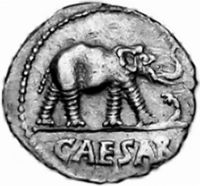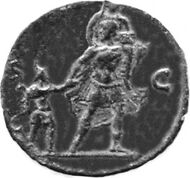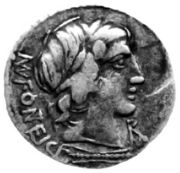Gaius Iulius Caesar (name)
The etymology of the name Casear, as in Roman leader Julius Caesar.
The cognomen Caesar
In earlier times Caesar had originally been a praenomen.[1] The suffix –ar was highly unusual for the Latin language, which might imply a non-Latin origin of the name. The etymology of the name Caesar is still unknown and was subject to many interpretations even in antiquity. Caesar himself propagated the derivation from the Moorish or Punic word for "elephant",[2] thereby following the claims of his family that they inherited the cognomen from an ancestor, who had received the name after killing an elephant, possibly during the first Punic War. Since the Gauls came to know the elephant through the Punic commander Hannibal, it is possible that the animal was also known under the name caesar in Gaul. Caesar may have used the animal during his conquest of Gaul and Britain[3] and displayed an elephant above the name CAESAR on his first denarius, which he probably had minted while still in Gallia Cisalpina. Apart from using the elephant as a claim for extraordinary political power in Rome,[4] the coin is an unmasked allusion to the etymology of the name and directly identifies Caesar with the elephant, because the animal treads a Gallic serpent-horn, the carnyx, as a symbolic depiction of Caesar's own victory.[5]
Several other interpretations were propagated in antiquity:
- a caesis oculis[6] ("because of the blue [or: grey] eyes"): Caesar's eyes were black,[7] but since the despotic dictator Sulla had had blue eyes, this interpretation might have been created as part of the anti-Caesarian propaganda in order to present Caesar as a tyrant.
- a caesaries ("because of the hair")[8]: Since Caesar was balding, this interpretation might have been part of the anti-Caesarian mockery.
- a caeso matris utero ("born by Caesarean section")[9]: In theory this might go back to an unknown Julian ancestor who was born in this way. On the other hand it could also have been part of the anti-Caesarian propaganda, because in the eyes of the Republicans Caesar had defiled the Roman "motherland", which was also reported for one of Caesar's dreams, in which he committed incest with his mother, i.e. the earth.[10]
Another interpretation of Caesar deriving from the verb caedere ("to cut") could theoretically have originated in the argument of the Julians for receiving a sodality of the Lupercalia, the luperci Iulii (or Iuliani). Since the praenomen Kaeso (or Caeso) was at first a proprietary name of the Quinctii and the Fabii, possibly derived from their ritual duty of striking with the goat-skin (februis caedere) at the luperci Quinctiales and the luperci Fabiani respectively, the Julians would then have argued that the name Caesar was identical to the Quinctian and Fabian Kaeso.[11] The identification of the cognomina Kaeso and Caesar was indeed supposed by Pliny, but is—according to Alföldi (1975)—unwarranted.[12]
The nomen gentile Iulius or Julius
The gens Iulia received their name from Ascanius, who was also called Iulus[13], their common ancestor and son of Aeneas. His cognomen Iulus is a derivative of iulus, meaning "wooly worm".[14] Such nicknames were typical for cognomina and were the base of old gentilician names.[15]
Weinstock (1971) made a case for Iullus being a diminuitive form of Iovis, an older name for the god Iuppiter (Jupiter), i.e. the name of a young Iuppiter. Weinstock's argument however relies on a hypothetical intermediate form *Iovilus, and he stated himself that Iullus can't originally have been a theophoric name and could therefore only have become one at a secondary stage, after the Julians had established the identification of Iulus as their gentilician god Vediovis (also: Veiovis), who was a "young Iuppiter" himself.[17] Therefore Alföldi (1975) is correct in rejecting this proposed etymological origin.
Members of the Julian clan like their chronicler Lucius Caesar later connected the name Iulus with ἰοβόλος ("the good archer") and ἴουλος ("the youth whose first beard is growing").[18] This has however no etymological value and is only a retrofitting interpretation concernced with the earlier institution of the Vediovis-cult in Rome together with a statue of Iulus-Vediovis as a bearded archer.[19] Others derived Iulius from king Ilus, who was the founder of Ilium.[20] Weinstock rightfully called these the "usual playful etymologies of no consequence".[21]
---
References
- ↑ Auct. de praen. 3. Quoted in Stefan Weinstock: Divus Julius (Oxford 1971/2004).
- ↑ Historia Augusta, Aelius 2.3; Servius, Commentary on the Aeneid 1.286 i.a.; cp. Pauly-Wissowa RE X 464sq
- ↑ Polyaenus (Stratagems 8:23.5) tells the story about Caesar using an armoured elephant during his expeditions at the river Thames, which may derive from a confusion with Claudius' use of elephants in his conquest of Britain in AD 43 (cf. Cassius Dio, Roman History 60:21), but may be connected with this interpretation of Caesar's name.
- ↑ Artemidorus established that the elephant, undoubtedly a symbol of honor (and arrogance), denoted a δεσποτης ("lord"), a βασιλευς ("imperator [of Rome]"; "king [in Greece]) or a και ανηρ μεγιστος ("man in high authority") on the Italian mainland. Therefore the coin would have to be seen as a presage for Caesar's future dominion. (From Stevenson et al.: A Dictionary of Roman Coins: Republican and Imperial. London 1889.)
- ↑ Cf. Christoph Battenberg: Pompeius und Caesar: Persönlichkeit und Programm in ihrer Münzpropaganda (Marburg/Lahn 1980). Furthermore the elephant was a counter-symbol against the gens Caecilia, whose heralding symbol was the elephant, attesting victories gained by the Metelli in Sicily (250 BC) and Macedonia (148 BC). In 49 BC Metellus Scipio had ordered Caesar to surrender his army, although Pompeius was levying troops, and the Metelli had also tried to stop Caesar from confiscating the state treasury in the temple of Saturn, where Caesar eventually had his coins struck. Therefore Caesar's propaganda communicated not only the taking of the treasure but also the taking of his enemies' symbol and placed his own victory over Gaul above the Metellan victories.
- ↑ Historia Augusta, Aelius 2.3
- ↑ Suetonius, Julius 45
- ↑ According to Sextus Pompeius Festus.
- ↑ Pliny the Elder, Natural History 7.7
- ↑ Suetonius, Julius 7; Cassius Dio 37.52.2
- ↑ A later Republican inscription mentions a member of the Julian clan named K(AESO) IVLIVS (CIL 12.2806).
- ↑ Andreas Alföldi: "Review of St. Weinstock, Divus Julius". In: Gnomon 47 (1975). 154–179.
- ↑ Early form: Iullus
- ↑ Later used by Pliny for the wooly part of a plant.
- ↑ E.g. claudus ("lame", "crippled") for Claudius, Petro ("bumpkin", "fool") for Petronius etc.
- ↑ The coin shows the Julian gentilician god Vediovis identified as Apollo and also bearing attributes of Iuppiter, i.e. the thunderbolt beneath the head.
- ↑ Verrius Flaccus: Paul. 379 M. (519 L.); Ovid F. 3.437 (on Veiovis on the Capitol). Aeneas had been divinized as Iuppiter indiges, which supported the identification of Aeneas' son Iulus as the "young Iuppiter" Vediovis, especially since Iulus had inaugurated Aeneas' cult and had built him a temple in Alba Longa.
- ↑ Servius, Commentary on the Aeneid 1.267.
- ↑ Cf. the identification of Vediovis with Iuppiter and Apollo (see above; Rev. Num. 1971; Chiron 2, 1972; Sydenham 76 et al.).
- ↑ Verg. Aen. 1.267, in: Servius (and Dan.) Commentary on the Aeneid 1.267.
- ↑ "Divus Julius", Oxford 1971, p. 9.


